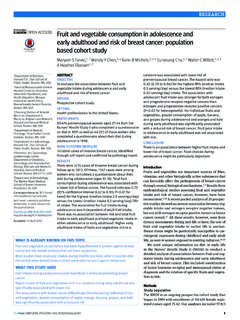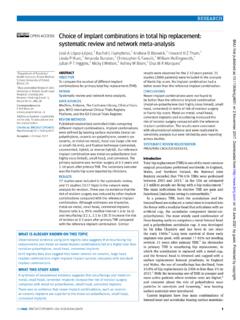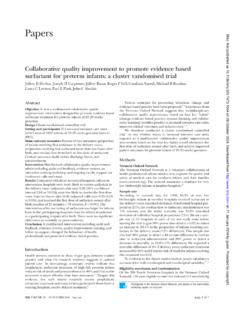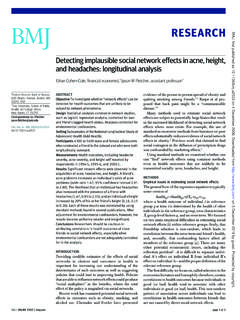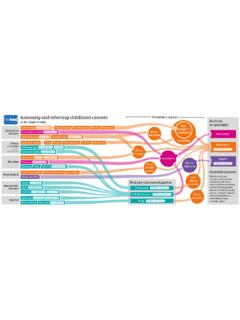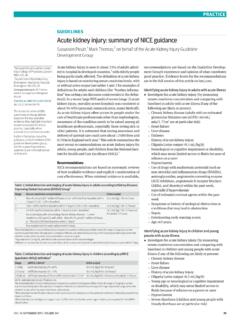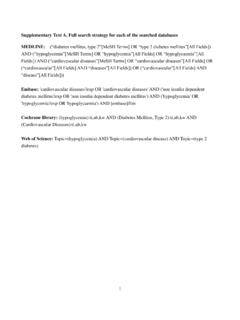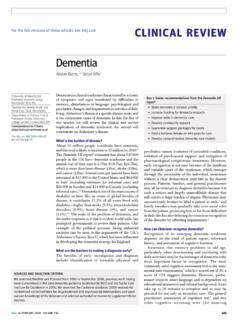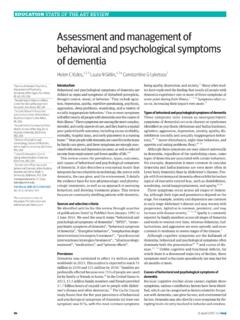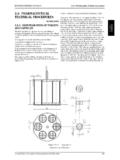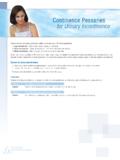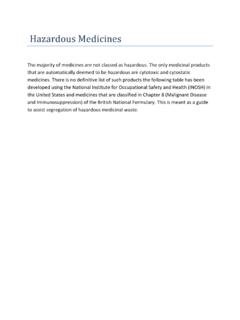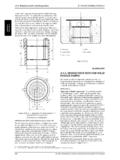Transcription of Dexamethasone versus standard treatment for …
1 The bmj | BMJ 2017;357:j1455 | doi: accessCorrespondence to: L Magill, Birmingham Clinical Trials Unit, Institute of Applied Health Research, University of Birmingham, Birmingham B15 2TT, UK material is published online only. To view please visit the journal this as: BMJ 2017;357:j1455 : 14 March 2017 Dexamethasone versus standard treatment for postoperative nausea and vomiting in gastrointestinal surgery: randomised controlled trial (DREAMS Trial)DREAMS Trial Collaborators and West Midlands Research CollaborativeABSTRACTObjeCtivesTo determine whether preoperative Dexamethasone reduces postoperative vomiting in patients undergoing elective bowel surgery and whether it is associated with other measurable benefits during recovery from surgery, including quicker return to oral diet and reduced length of two arm parallel group randomised trial with blinded postoperative care and outcome UK patients aged 18 or over undergoing elective open or laparoscopic bowel surgery for malignant or benign of a single dose of 8 mg intravenous Dexamethasone at induction of anaesthesia compared with standard OutCOMe MeasuresPrimary outcome.
2 Reported vomiting within 24 hours reported by patient or clinician. Secondary outcomes: vomiting with 72 and 120 hours reported by patient or clinician; use of antiemetics and postoperative nausea and vomiting at 24, 72, and 120 hours rated by patient; fatigue and quality of life at 120 hours or discharge and at 30 days; time to return to fluid and food intake; length of hospital stay; adverse participants were recruited and randomly allocated to additional Dexamethasone (n=674) or standard care (n=676) at induction of anaesthesia. Vomiting within 24 hours of surgery occurred in 172 ( ) participants in the Dexamethasone arm and 223 ( ) allocated standard care (number needed to treat (NNT) 13, 95% confidence interval 5 to 22; P= ).
3 Additional postoperative antiemetics were given (on demand) to 265 ( ) participants allocated Dexamethasone and 351 ( ) allocated standard care (NNT 8, 5 to 11; P< ). Reduction in on demand antiemetics remained up to 72 hours. There was no increase in of a single dose of 8 mg intravenous Dexamethasone at induction of anaesthesia significantly reduces both the incidence of postoperative nausea and vomiting at 24 hours and the need for rescue antiemetics for up to 72 hours in patients undergoing large and small bowel surgery, with no increase in adverse registratiOnEudraCT (2010-022894-32) and ISRCTN (ISRCTN21973627).IntroductionPostoperati ve nausea and vomiting (PONV) are the most common complications after surgery, affecting more than 30% of patients,1 2 and are reported by patients to be two of the five most undesirable Evidence has been conflicting regarding type of surgery and risk of PONV, but a systematic review has shown that laparo-scopic surgery and increasing duration of surgery are independent predictors of higher There are many published studies reporting increased risk after urologi-cal or biliary tract surgery, but there is a relative paucity of data regarding small or large bowel surgery.
4 A recent study has shown that even after introduction of an enhanced recovery protocol, nearly 35% of patients undergoing colonic resection required antiemetics on demand in the postoperative period,5 and so PONV remains a common adverse event even within a selected optimised PONV is related to anaesthetic use in many operations, but in bowel surgery, the bowel handling, resection, and associated intra-abdominal contamination promote an ileus of variable duration and has a major effect on PONV. PONV contributes to both delayed recovery and delayed discharge, and its prevention is of particular importance after gastrointes-tinal surgery because these patients often have poor preoperative nutrition, as highlighted by a UK nutrition survey in which 40% of patients with gastrointestinal disease were deemed at high risk of malnutrition on admission to hospital, significantly higher than the baseline for all hospital IS AlReAdy knoWn on ThIS TopICPostoperative nausea and vomiting (PONV) are the most common complications after surgery, affecting more than 30% of patients.
5 In patients undergoing bowel surgery PONV often contributes to delayed recovery and is especially important because these patients might also have impaired preoperative nutritionDexamethasone has been shown to have a substantial benefit in the prevention of PONV in patient undergoing low and intermediate risk surgery but has not been evaluated in those undergoing bowel surgeryWhAT ThIS STudy AddSIn patients undergoing bowel surgery, a single dose of 8 mg intravenous Dexamethasone at induction of anaesthesia (in addition to standard care) had no significant increase in adverse events and reduced episodes of vomiting and patient rated clinically important postoperative nausea and vomiting for 24 hours after surgeryPatients receiving of a prophylactic single dose of 8 mg of intravenous Dexamethasone before surgery also required fewer postoperative antiemetics for up to 72 hours on 12 January 2019 by guest.
6 Protected by : first published as on 18 April 2017. Downloaded from doi: | BMJ 2017;357:j1455 | the bmjRESEARCH2 Dexamethasone is a potent corticosteroid that has been reported to influence patient and clinician based outcome measures of 8 I t has been carefully assessed in the prevention of PONV in low and inter-mediate risk surgery and shown to have a substantial benefit. In a trial of over 4000 patients that assessed 64 different combinations of anaesthetic measures, Dexamethasone effectively reduced Only 11% of patients, however, underwent abdominal proce-dures, of whom only a small fraction underwent bowel The study found that multiple interventions (use of more than one antiemetic) should be reserved for high risk patients.
7 As outlined above, patients undergoing large or small bowel surgery have not his-torically been thought to be at high is one of several drugs recom-mended for patients at moderate and high risk of PONV in the consensus guidelines from the Society for Ambu-latory Anesthesia10 and is commonly advocated in pro-tocols for enhanced recovery after gastrointestinal surgery (ERAS).11-13 I ts value in bowel surgery, however, is unproved and its use is far from universal. Two single centre trials, totalling 100 patients undergoing bowel surgery, reported no benefit of Dexamethasone on 15 Before designing this trial, we surveyed six major colorectal units in the West Midlands region and found that only 25% of colorectal patients were receiv-ing Dexamethasone on induction of use of steroids such as Dexamethasone can have dangerous side effects, including an increased risk of wound infection and anastomotic leak, which adversely affect recovery from gastrointestinal surgery.
8 A single dose, however, does not seem to be associated with this increased risk. Though a systematic review of single dose methylprednisolone in patients undergoing cardiac, general, or trauma surgery showed no signifi-cant increase in these adverse events,16 concerns among the surgical community might still be limiting its use during surgery of the large and small mechanism of action of Dexamethasone is poorly understood, but it seems to be most effective when it is administered before the start of surgery, when it can also reduce surgery induced A meta-analysis of patients undergoing thyroidectomy found that Dexamethasone at 8-10 mg had the greatest effect in reducing DREAMS trial examined whether preoperative Dexamethasone reduces postoperative vomiting in patients undergoing elective gastrointestinal surgery.
9 Reduction of PONV in this group of patients could improve the surgical experience and also fast track recovery and decrease postoperative complications. In assessing whether multi-modal use of antiemetics in this cohort improves outcomes, we designed a pragmatic trial that would incorporate the use of one standard antiemetic with or without the addition of a single dose of 8 mg intrave-nous Dexamethasone , a drug with proved antiemetic properties (in other groups of patients) but that has a dif-ferent mechanism of action to the other commonly used antiemetics. If beneficial, Dexamethasone could be a valu-able addition for patients undergoing intestinal design and eligibilityDREAMS is a pragmatic blinded multicentre randomised controlled trial of 1350 participants comparing the effects of a single dose of 8 mg intravenous Dexamethasone against standard care on patient recovery after small and large bowel surgery.
10 Though the anaesthetist knew the treatment allocation, patients and clinical staff involved in postoperative care and data collection were blinded to it. The trial included an internal pilot study of 150 participants to assess recruitment rates, the randomisation process, patient pathway, and data collection tools (outcomes from participants in the pilot phase are included in this main trial analysis and have not been analysed previously).Eligible patients were adults (aged 18 and over) with ability to consent who were undergoing elective open or laparoscopic bowel surgery for malignant or benign pathology. Patients were approached at the first outpa-tient clinic, at the preoperative assessment clinic, or on admission for surgery.
